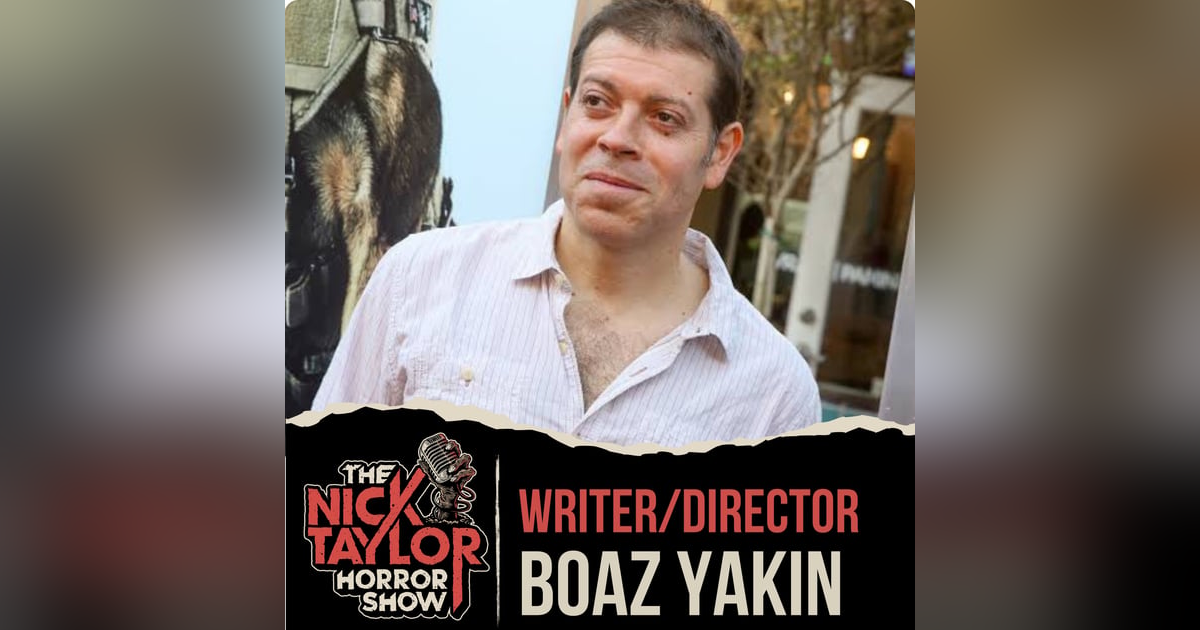Writer/Director, Boaz Yakin

Boaz Yakin is a New York City–born filmmaker, screenwriter, and producer known for his versatile work across indie dramas, mainstream hits, genre films, and TV. He began his career young, selling his first screenplay (The Punisher) at 19, and quickly made a name for himself with gritty urban stories and emotionally resonant character work.
Boaz directed Remember the Titans with Denzel Washington, Safe starring Jason Statham, Max, Uptown Girls, A Price Above Rubies, Death in Love and his indie horror mystery Boarding School among many others.
Beyond directing, as a writer, his credits include The Rookie, Prince of Persia: The Sands of Time, and Now You See Me. He is also the executive producer and writer for the noir Apple TV+ series Lady in the Lake, and was executive producer of Hostel and Hostel 2 as one of the founding members of Raw Nerve alongside Eli Roth.
As impressive as this intro is, it still reflects only a small portion of Boaz’s prolific, extensive, and diverse body of work.
In this conversation, Boaz discusses his career as well as his evolution as a filmmaker, the challenges of working within and outside the Hollywood system, and why his favorite films are guided less by career strategy and more by creative curiosity. He also discusses how the key to rewarding work in cinema is chasing meaning, not validation.
This was a pretty awesome conversation that I was very honored to have with Boaz. Big thanks to my friend Scott Rose for putting us in touch. Without further ado, strap in, and get ready for this conversation with writer, director, and producer Boaz Yakin.
Key Takeaways
Learn Script Analysis
Boaz sold his first script at 19, but he didn’t just stumble into success or a superior storytelling ability — he was steeped in story from an early age. Growing up in a theatrical household and attending Stella Adler’s famed script analysis classes during high school gave him a formidable foundation in character, psychology, and subtext. This background trained him to understand the deeper currents beneath the text, a skill that directly influenced his ability to write sellable screenplays at such a young age and launch his career before he could even buy a drink.
This education also proved invaluable for Boaz as a director. Stella Adler taught that actors — and by extension, writers and directors — must understand every facet of a character’s environment: their culture, their religion, the tone of the scene and even the weather. These contextual details inform performance and behavior and are the difference between movies and cinema.
For filmmakers, building full character and environmental context informs every decision on set. The key lesson here is the importance of foundational education because learning the principles of story and writing can pay long-term dividends.
Open Heart / Thick Skin
One of the most revealing points Boaz made was about the emotional toll of directing. Filmmakers are constantly having to say no to other creative collaborators — costume designers, cinematographers, actors — in order to preserve the vision of the film. Balancing that responsibility while also keeping your team inspired and not demoralized requires not only leadership, but emotional stamina and clarity of purpose.
Boaz notes that many successful directors tend to have narcissistic tendencies, which buffer them from the guilt or sensitivity that might get in the way of making tough decisions — but this can harm your work just as much as being a pushover. Being empathetic makes you a better artist and can help your work resonate with more people. What Boaz teaches us here is that in addition to being emotionally resilient, directors must be emotionally intelligent. It’s a balance you must learn.
Questions, Not Answers
Boaz expresses a deep discomfort with the notion of cinema as a medium for delivering clean messages or moral conclusions. He’s more drawn to the ambiguity of human experience — the gray areas where identity, emotion, and ideology collide without resolution.
When discussing his film Boarding School, Boaz emphasized that it wasn’t designed to convey a tidy moral or heroic arc. Instead, it was structured to explore unsettling territory — gender identity, family trauma, and psychological inheritance — without offering a clear-cut explanation or resolution. This reinforces his view that film should open up difficult questions rather than provide narrative comfort.
Boaz praises films like The Texas Chainsaw Massacre and Eyes Without a Face, not because they deliver messages, but for how they immerse viewers in mood, tone, and unease. He favors directors like Mario Bava and early Dario Argento, who constructed dreamlike, expressionist horror worlds that evoke emotion and dread without spelling things out. Boaz’s appreciation for these filmmakers is tied directly to their ability to leave room for interpretation and disorientation — and for questions.
For Boaz, real filmmaking — particularly in horror — still carries the capacity to push boundaries and leave the audience with discomfort and ambiguity. He believes that when filmmakers use the medium to explore rather than resolve, they not only reflect the true complexity of life but also respect the intelligence of their audience.
Show Notes
Movies Discussed
- Texas Chainsaw Massacre (1974)
- Eyes Without a Face (1960)
- Psycho (1960)
- Night of the Living Dead (1968)
- Dawn of the Dead (1978)
- Day of the Dead (1985)
- Henry: Portrait of a Serial Killer (1986)
- The Hills Have Eyes (1977)
- The Hostel series (2005, 2007)
- Boarding School (2018)
- Cemetery Man (Dellamorte Dellamore, 1994)
- Black Sabbath (1963)
- Black Sunday (1960)
- Blood and Black Lace (1964)
- Zombie (1979)
- The Beyond (1981)
- World War Z (2013)
- Now You See Me (2013)
- Fresh (1994)
- Remember the Titans (2000)
- A Price Above Rubies (1998)
- Aviva (2020)
Books & Writing
- The Artist’s Way by Julia Cameron
Follow Boaz Yakin at:
- IMBd: https://www.imdb.com/name/nm0945026/
- Instagram: https://www.instagram.com/boazyakinofficial/
- X (Twitter): https://x.com/boaz_yakin







